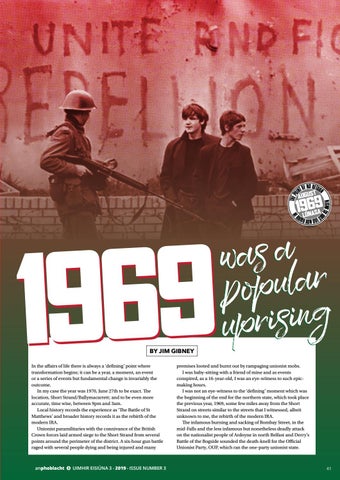F NO RET INT O STURN
THE PO
AUGU
was alar opu ng i s i r up
BY JIM GIBNEY
In the affairs of life there is always a ‘defining’ point where transformation begins; it can be a year, a moment, an event or a series of events but fundamental change is invariably the outcome. In my case the year was 1970, June 27th to be exact. The location, Short Strand/Ballymacarrett; and to be even more accurate, time wise, between 9pm and 3am. Local history records the experience as ‘The Battle of St Matthews’ and broader history records it as the rebirth of the modern IRA. Unionist paramilitaries with the connivance of the British Crown forces laid armed siege to the Short Strand from several points around the perimeter of the district. A six-hour gun battle raged with several people dying and being injured and many
anphoblacht UIMHIR EISIÚNA 3 - 2019 - ISSUE NUMBER 3
R AS
ÚNASA
IB HLAO N D UL S
NI
1969
AN SI N
1RA 969IA
premises looted and burnt out by rampaging unionist mobs. I was baby-sitting with a friend of mine and as events conspired, as a 16-year-old, I was an eye-witness to such epicmaking hours. I was not an eye-witness to the ‘defining’ moment which was the beginning of the end for the northern state, which took place the previous year, 1969, some few miles away from the Short Strand on streets similar to the streets that I witnessed, albeit unknown to me, the rebirth of the modern IRA. The infamous burning and sacking of Bombay Street, in the mid-Falls and the less infamous but nonetheless deadly attack on the nationalist people of Ardoyne in north Belfast and Derry’s Battle of the Bogside sounded the death-knell for the Official Unionist Party, OUP, which ran the one-party unionist state.
41

















